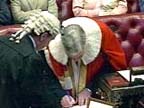Not another hurricane .. and meanwhile is Lord Black going to jail?
Sep 24th, 2005 | By Randall White | Category: Key Current Issues Fortunately the impact of Hurricane Rita on the US Gulf Coast has not proved as disastrous as the worst-case scenarios predicted. Meanwhile, this past week has brought further evidence that storms and disasters of other sorts are also abroad in the North American wilderness.
Fortunately the impact of Hurricane Rita on the US Gulf Coast has not proved as disastrous as the worst-case scenarios predicted. Meanwhile, this past week has brought further evidence that storms and disasters of other sorts are also abroad in the North American wilderness.
Way up north, some Canadians have even been pleased by fresh reports which appear to enhance the prospects that press baron Conrad Black will be going to jail, for “corporate kleptocracy.” Mr. Black’s longtime financier, David Radler, has now agreed to testify against Mr. Black in US legal actions. In exchange Mr. Radler will receive a reduced sentence for his own admitted misconduct in the old Hollinger international media empire. This will not necessarily put Mr. Black himself behind bars. But it could make it more likely that this is where he will land in the end. Does he deserve to be there? That is … well, a question anyway.
Recent summary of Conrad Black story in the UK Independent
 According to a somewhat neutral press report by “Katherine Griffiths in New York,” from The Independent in the United Kingdom (where Mr. Black and his well-matched wife Barbara Amiel currently have their main home base): “The fate of Conrad Black, the former owner of The Daily Telegraph who faces several lawsuits for allegedly looting millions of dollars from his publishing empire, looked increasingly gloomy last night when his erstwhile right-hand-man admitted charges that he took part in a $32m (17.8m) fraud.
According to a somewhat neutral press report by “Katherine Griffiths in New York,” from The Independent in the United Kingdom (where Mr. Black and his well-matched wife Barbara Amiel currently have their main home base): “The fate of Conrad Black, the former owner of The Daily Telegraph who faces several lawsuits for allegedly looting millions of dollars from his publishing empire, looked increasingly gloomy last night when his erstwhile right-hand-man admitted charges that he took part in a $32m (17.8m) fraud.
“Federal prosecutors hope the guilty plea from David Radler, the former chief operating officer of Hollinger International, the newspaper’s former parent company, will help them implicate Lord Black.
 “The media magnate’s demise has been a spectacular one. He built up a global newspaper empire which at its peak boasted both The Daily Telegraph and The Sunday Telegraph titles, The Jerusalem Post and The Chicago Sun-Times. His position enabled him to promote his stridently right-wing … agenda, as well as cementing his position in high society. The extravagant lifestyle of Lord Black and his wife, Barbara Amiel, became legendary. They had homes in Kensington, London, New York, Toronto and Palm Beach, Florida.
“The media magnate’s demise has been a spectacular one. He built up a global newspaper empire which at its peak boasted both The Daily Telegraph and The Sunday Telegraph titles, The Jerusalem Post and The Chicago Sun-Times. His position enabled him to promote his stridently right-wing … agenda, as well as cementing his position in high society. The extravagant lifestyle of Lord Black and his wife, Barbara Amiel, became legendary. They had homes in Kensington, London, New York, Toronto and Palm Beach, Florida.
“But the revelations that Lord Black had allegedly looted millions of dollars and paid himself excessive fees led to his being ousted as the chief executive of Hollinger in November 2003, and forced to step down as chairman in the following January. He is being sued by the Securities and Exchange Commission along with some of his close associates.”
Deeper background from the CBC website in Canada
 The English-language CBC in Canada remains in a mild disaster-mode itself at the moment. But its website continues to work. And it includes deeper background summaries of the Canadian content on Mr. Black: “He studied his way to a history degree at Carleton University, a law degree from Laval and an MA from McGill … In his 20s, Black began buying small Canadian newspapers and, in 1971, he co-founded the Sterling Newspapers Group. In 1978, he became chair of the Argus Corporation a position he used as a launch-pad to start the Hollinger group.
The English-language CBC in Canada remains in a mild disaster-mode itself at the moment. But its website continues to work. And it includes deeper background summaries of the Canadian content on Mr. Black: “He studied his way to a history degree at Carleton University, a law degree from Laval and an MA from McGill … In his 20s, Black began buying small Canadian newspapers and, in 1971, he co-founded the Sterling Newspapers Group. In 1978, he became chair of the Argus Corporation a position he used as a launch-pad to start the Hollinger group.
“By the 1990s Hollinger controlled 60 per cent of Canadian newspaper titles, as well as hundreds of dailies in the U.S., England, Australia and Israel … Black became known for taking over newspapers and chopping away the fat (and much of the meat as well), resulting in job losses. Criticism aside, these newspapers often turned a profit within a year. So large was his appetite for newspapers that at one point, he was the third-largest newspaper publisher in the world. At its peak in 1999, Hollinger had revenues over $2 billion.
 “All the money and fame (or infamy) that came with this empire was not quite enough for Black he wanted a title to go along with it … In 1999, the British government moved to make him Lord Black. This elicited strong opposition from Prime Minister Jean Chrtien who pointed to the Nickle Resolution of 1919, which ruled that foreign governments could not grant honours to Canadians that carry a title or privilege. Black challenged the ruling unsuccessfully in court.
“All the money and fame (or infamy) that came with this empire was not quite enough for Black he wanted a title to go along with it … In 1999, the British government moved to make him Lord Black. This elicited strong opposition from Prime Minister Jean Chrtien who pointed to the Nickle Resolution of 1919, which ruled that foreign governments could not grant honours to Canadians that carry a title or privilege. Black challenged the ruling unsuccessfully in court.
“Determined to get his title, Black renounced his Canadian citizenship and was officially inducted into the British House of Lords … on October 31, 2001.”
 The CBC website also includes an engaging sketch of Conrad Black and Barbara Amiel by the old Toronto humourist from Winnipeg Larry Zolf – best known in some quarters for his striking characterization of the political career of Pierre Trudeau as a journey “from philosopher king to Mackenzie King” (though you do have to know quite a lot about Canadian political history these days to get the joke). Mr. Zolf wrote his sketch when Mr. Black was ousted as the chief executive of Hollinger in November 2003. And as Mr. Zolf confesses quietly, he does seem to have been friends of a sort at one point with both Mr. Black and Ms. Amiel.
The CBC website also includes an engaging sketch of Conrad Black and Barbara Amiel by the old Toronto humourist from Winnipeg Larry Zolf – best known in some quarters for his striking characterization of the political career of Pierre Trudeau as a journey “from philosopher king to Mackenzie King” (though you do have to know quite a lot about Canadian political history these days to get the joke). Mr. Zolf wrote his sketch when Mr. Black was ousted as the chief executive of Hollinger in November 2003. And as Mr. Zolf confesses quietly, he does seem to have been friends of a sort at one point with both Mr. Black and Ms. Amiel.
 From the start Zolf makes clear that in his view: “The media joy at Conrad Black’s comeuppance is understandable but not quite as fair and deserving as it ought to be.” He goes on to deliver various warmer if still not uncritical perspectives, including a nice account of what used to be the Canadian business romance of the century: “When Black met Barbara Amiel it was like the sky opened up for both of them. Now Black had added true love to his repertoire. It was a real meeting of minds and bodies. The beautiful Amiel was as conservative as Black, as Ayn Randish, as Zionist, as rugged an individualist. And even better, she was a convert to Black’s conservatism before she ever knew him.
From the start Zolf makes clear that in his view: “The media joy at Conrad Black’s comeuppance is understandable but not quite as fair and deserving as it ought to be.” He goes on to deliver various warmer if still not uncritical perspectives, including a nice account of what used to be the Canadian business romance of the century: “When Black met Barbara Amiel it was like the sky opened up for both of them. Now Black had added true love to his repertoire. It was a real meeting of minds and bodies. The beautiful Amiel was as conservative as Black, as Ayn Randish, as Zionist, as rugged an individualist. And even better, she was a convert to Black’s conservatism before she ever knew him.
“When I first met Barbara Amiel she was a funny, quirky Jewish lady of the Trotskyite persuasion hanging around University College at the University of Toronto. At the time, she had a well-off boyfriend reputed to have connections to organized crime. He bought her cashmere sweaters and skirts by the dozen …”
Is he guilty of … just what … and/or does he deserve to go to jail?
 Another current UK piece, by “David Teather in New York,” from The Guardian, quickly summarizes Mr. Black’s own view of his conduct in guiding his empire: “Lord Black was ousted as Hollinger chief executive in November 2003 after an internal inquiry sparked by a disgruntled shareholder … A 500-page internal report accused Lord Black of running a corporate kleptocracy’ and of pursuing an endless quest’ for cash. Lord Black denies all wrongdoing and has launched countersuits against Hollinger.”
Another current UK piece, by “David Teather in New York,” from The Guardian, quickly summarizes Mr. Black’s own view of his conduct in guiding his empire: “Lord Black was ousted as Hollinger chief executive in November 2003 after an internal inquiry sparked by a disgruntled shareholder … A 500-page internal report accused Lord Black of running a corporate kleptocracy’ and of pursuing an endless quest’ for cash. Lord Black denies all wrongdoing and has launched countersuits against Hollinger.”
Now that David Radler has agreed to testify against Mr. Black in the US legal action, in September 2005, there have been “reports in the US media … that Lord Black could in turn be planning to point the finger of blame firmly at Mr Radler. According to the Wall Street Journal, Lord Black has been building a defence strategy arguing that he had not been a hands-on manager and that any alleged misdeeds were down to Mr Radler … While Lord Black hobnobbed in London, Mr Radler worked behind the scenes in the company’s offices in Vancouver and Chicago.”
 As such things go, it also seems true enough that Mr. Black and Ms. Amiel have already suffered substantially through public humiliation and a downgraded lifestyle. As David Teather reports, Mr. Black’s “reputation has been left in tatters by the financial scandal. He has been forced to sell his lavish London townhouse as well as a mansion in Palm Beach, Florida.”
As such things go, it also seems true enough that Mr. Black and Ms. Amiel have already suffered substantially through public humiliation and a downgraded lifestyle. As David Teather reports, Mr. Black’s “reputation has been left in tatters by the financial scandal. He has been forced to sell his lavish London townhouse as well as a mansion in Palm Beach, Florida.”
Katherine Griffiths in The Independent adds her own further information on this branch of the subject: “The shadow of the lawsuits had already forced the Blacks to pare down their luxurious lifestyle. The palatial home in Kensington has been sold for 13m to a former Mexican beauty queen, as have the private jets. The house in Florida is also on the market. The couple are now staying in a Knightsbridge hotel suite, in London, but they are thought to be looking for an apartment to rent.”
Does any of this mean anything at all for Canada?
 The short answer to this question is of course a simple No.
The short answer to this question is of course a simple No.
In the broad sweep of Canadian history “Lord Black of Crossharbour” is just the last in a long line of British North American business leaders (or “entrepreneurs” as George W. Bush might say), who have tried to use their intermittent business success to buy their way into the noble if now much faded romance of the English aristocracy. In the world of Canadian content Lord Black is just a last if still more expansive and briefly successful gasp of “the plunger” Sir Henry Pellatt in the early 20th century – who built Casa Loma in Toronto, annoyed his neighbours in the adjoining lesser mansions of the local plutocracy, took his retainers from a local colonial militia regiment to London to see the King, and then whiled away his last days in a two-bedroom house in an obscure part of the city.
 Conrad Black is at best a part of what Globe and Mail columnist John Ibbitson would call the “old Canada” that is vanishing slowly but surely at long last. He has removed himself from the new or “next Canada” that is now struggling out of the wings. (And note as well Jean Chrétien biographer Lawrence Martin in the same Canadian newspaper still more recently, just this past week: “Some day a cultural revolution will have to start up again. I nominate now.”)
Conrad Black is at best a part of what Globe and Mail columnist John Ibbitson would call the “old Canada” that is vanishing slowly but surely at long last. He has removed himself from the new or “next Canada” that is now struggling out of the wings. (And note as well Jean Chrétien biographer Lawrence Martin in the same Canadian newspaper still more recently, just this past week: “Some day a cultural revolution will have to start up again. I nominate now.”)
This new or next Canada of today might even be said to have begun ever so gradually with the 1919 Nickle Resolution, which Jean Chrétien no doubt did more patriotically stand up for, when he refused to let Mr. Black become an English Lord while remaining a Canadian citizen in 2001.
(And it was Jean Chrétien and not Conrad Black who knew how to win Canada’s version of democratic elections. M. Chrétien was a mere peasant in Mr. Black’s view, but so are most Canadians, of course.)
The authors of the CBC website similarly stress that most recently Mr. Black “has weighed in heavily with his views that Britain should join NAFTA and that Canada should become part of the U.S.” (In which case it would not matter that Mr. Black is no longer a Canadian citizen.)
 Still, more than a few among the Canadian anglophone chattering classes, such as they are (and especially in the harsh estimation of Mr. Black and Ms. Amiel), probably will continue to believe that Conrad Black has had one or two if not exactly redeeming then at least interesting virtues from the land of the northern lights. More exactly, as the CBC website authors also note: “He’s not just a tycoon. Black has written several books ….”
Still, more than a few among the Canadian anglophone chattering classes, such as they are (and especially in the harsh estimation of Mr. Black and Ms. Amiel), probably will continue to believe that Conrad Black has had one or two if not exactly redeeming then at least interesting virtues from the land of the northern lights. More exactly, as the CBC website authors also note: “He’s not just a tycoon. Black has written several books ….”
Larry Zolf probably deserves the almost-last words here: “Then there was Conrad Black the historian. Single-handedly he wrote an epic revisionist history of former Quebec premier Maurice Duplessis. The Black epic rescued Duplessis from the liberal ashcan he had been put into by the Trudeau liberals and socialists. Black’s version provided the first real look at Duplessis in English.”
“Now there’s Black’s epic revisionist biography of Franklin Roosevelt. Once again, Black is tackling liberal bias and suggesting that Roosevelt is a hero because he saved capitalism in the 1930s in its worst crisis. One thinks of the Securities and Exchange Commission Roosevelt created and put Joe Kennedy, Wall Street’s number one manipulator, in charge of, the theory being that it takes a thief to stop a thief.”
 The greatest historic irony in all this is no doubt that if Conrad Black does finally go to jail, it will be the US government that puts him there. As assorted voices in the Canadian media have quietly alluded to over the past few days, even with the Nickel Resolution of 1919 and all that, Canadian governments today – in Ottawa or any of the provinces (including francophone Quebec) – would almost certainly still not go quite so far as to put Conrad Black in jail. He should have kept his Canadian citizenship, whatever else. It could have come in handy.
The greatest historic irony in all this is no doubt that if Conrad Black does finally go to jail, it will be the US government that puts him there. As assorted voices in the Canadian media have quietly alluded to over the past few days, even with the Nickel Resolution of 1919 and all that, Canadian governments today – in Ottawa or any of the provinces (including francophone Quebec) – would almost certainly still not go quite so far as to put Conrad Black in jail. He should have kept his Canadian citizenship, whatever else. It could have come in handy.

